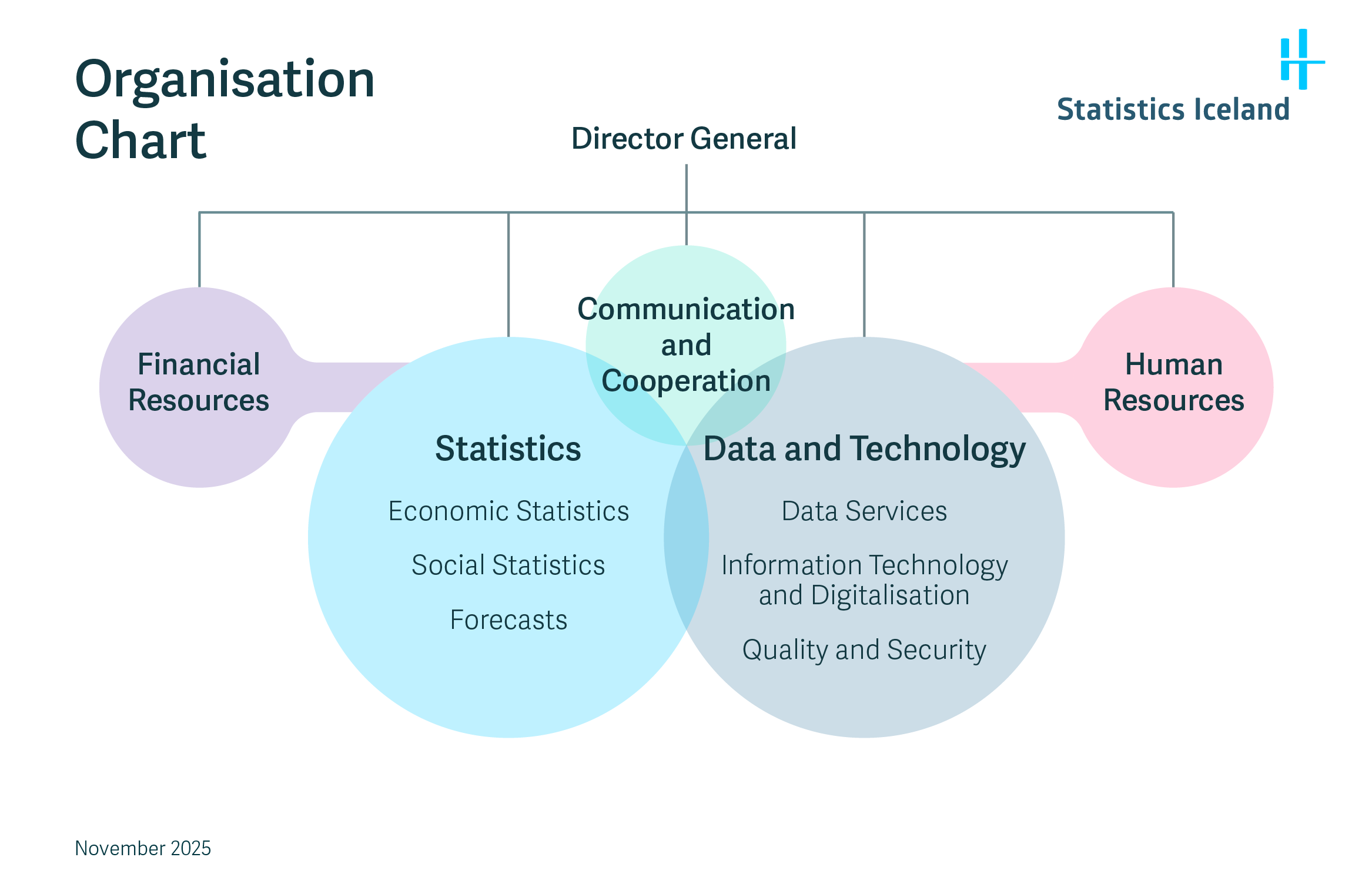Statistics Iceland
Statistics Iceland is the centre for official statistics in Iceland, founded in 1914 and has the leading role in the organisation, coordination and conduct thereof. The institution collects statistical information about Icelandic society, processes and communicates data to users which contributes to an informed social debate and is the basis for democratic decisions. Director-General is Hrafnhildur Arnkelsdóttir.

Data and technology
The division is responsible for the operation and development of data, data infrastructure and information technology, as well as quality and security issues. The division consists of three units: Data services, IT and digitalisation, and Quality and security. Director of division is Margrét Kristín Indriðadóttir.
Data services
The department is responsible for maximizing the quality and utilisation of data through targeted data collection, systematic monitoring, and effective data quality measurements. This ensures that data is categorised, stored, and processed in a consistent manner, which facilitates its utilisation. The department also handles communications with data providers and research participants, as well as the operation of a survey centre. Head of unit is Margrét Pétursdóttir.
IT and digitalisation
The department is responsible for the operation of computer systems, programming and custom software solutions. In addition, the department provides technical advice and professional support to other units of Statistics Iceland and has primary responsibility for the digital development of the organisation. This includes, among other things, the development of a harmonised data infrastructure. Head of unit is Auðunn Ragnarsson.
Quality and security
The unit is responsible for the operation and management of Statistics Iceland's information security management system and quality system. Quality and security manager is Sóley Halla Eggertsdóttir.
Statistics
The department processes and analyses data, as well as prepares and finalises content for publication. The department has three units: Social statistics, economic statistics and forecasts.
Social statistics
The department is responsible for calculating indices, including the consumer price index, wage indices, construction cost index, producer price index and related price indices, as well as international price comparisons. The department is also responsible for statistics on the labour market, living standards, population (including censuses), social protection, health, elections, media and culture, as well as statistics on wages, labour costs, income, debt, education and schooling. In addition, work is being done on developing energy statistics within the Department of Social statistics and compiling statistics on the use of information technology by households and individuals. Head of unit is Anton Örn Kralsson.
Economic statistics
The department is responsible for the compilation of national accounts and statistics on public finances, international trade in goods and services, operations, performance and demography of enterprises. The department also handles statistics related to fisheries, agriculture and tourism, as well as measuring expenditure on research and development in the economy. The department is also responsible for the compilation of environmental accounts of the economy, tourism accounts and economic accounts of agriculture. Head of unit is Magnús Kári Bergmann.
Forecasts
The department monitors the performance of the national economy and conducts analyses of the situation and prospects in the economy. Macroeconomic forecasts and plans are prepared and published in report form. According to the Public finance act, the forecasts form the basis for the budget proposal and public finance policy. The department also carries out other research projects related to the preparation of macroeconomic forecasts. The Forecasting department is an independent unit that is separate from the statistical production department. Head of unit is Marinó Melsted.
Communication and cooperation
The department is responsible for all of Statistics Iceland's publications and edits Statistics Iceland's content on the website and social media, as well as being responsible for the visual identity and coordination of Statistics Iceland's external communications. The department is also responsible for web design, information services, reception and switchboard, handling tailored statistics, service and cooperation with the research community and microdata services. In addition, the department manages customer service, user collaboration, and collaboration with other producers of statistical data. International collaboration also falls under the department. Ólafur Arnar Þórðarson communication manager is head of unit.
Financial resources
The department is responsible for finance, general operations, purchasing and accounting. Furthermore, it is responsible for accounting regarding the issuance of invoices and collections, payroll accounting, budgets and travel. In addition, the department is responsible for the operation of housing. Elsa Björk Knútsdóttir financial manager is head of unit.
Human resources
The department is responsible for supporting employees and managers by taking care of recruitment, career development, performance appraisal and employee welfare. It ensures that labour laws are respected, the working environment is safe and that the organisation has a qualified and satisfied workforce to achieve its goals. Jóda Elín V. Margrétardóttir is human resource manager.
